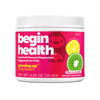What to Look for in a Kid's Magnesium Supplement
share this article

Magnesium is an essential mineral that supports numerous bodily functions, including bone development, muscle relaxation, energy production, and digestion. For kids, magnesium can also help support common issues like sleep disturbances, anxiety, and constipation.
Shop: Daily Growing Up™ Magnesium for kids from Begin Health
However, with so many magnesium supplements on the market, finding the right one for your kids can be challenging.
Here’s what to look for in a kid’s magnesium supplement to ensure it’s safe, effective, and tailored to your little one’s needs.
Kid-Specific Formulation
Always choose a magnesium supplement specifically designed for kids. These products have age-appropriate dosages and delivery methods, ensuring safety and efficacy.
Over-the-counter adult magnesium supplements may contain too much magnesium, leading to potential side effects like diarrhea or stomach discomfort.
Type of Magnesium
Different types of magnesium have unique benefits and absorption rates. For kids, these forms are ideal:
- Magnesium Citrate: Highly absorbable and effective for relieving constipation.
- Magnesium Glycinate: Gentle on the stomach and often used for calming benefits, such as improving sleep or reducing anxiety.
-
Magnesium Malate: Supports energy production and is ideal for active kids.
Avoid magnesium oxide, which is less absorbable and may cause gastrointestinal distress.
Begin Health Expert Tip
Here are the Key Differences between Magnesium vs Laxatives for Constipated Kids.
Appropriate Dosage
The recommended daily allowance (RDA) for magnesium varies by age:
- Ages 1–3: 80 mg/day
- Ages 4–8: 130 mg/day
When choosing a supplement, ensure the dosage aligns with these guidelines.
Supplements should provide a safe amount to complement dietary magnesium without exceeding the tolerable upper limit (65 mg/day for ages 1–3 and 110 mg/day for ages 4–8, for supplemental magnesium).
Shop: Daily Growing Up™ Magnesium for kids from Begin Health
Kid-Friendly Delivery Methods
Magnesium supplements for kids come in many formats such as:
- Powders: Can be mixed into drinks or foods.
- Chewables: Flavored tablets that are easy for kids to enjoy.
- Gummies: Fun and tasty but often contain added sugar.
Choose a format that fits your kid’s preferences and dietary needs.
Free From Additives
Look for supplements that are free from artificial flavors, colors, and sweeteners. If your kid has allergies or dietary restrictions, check for potential allergens like gluten, dairy, or soy.
Combines Well with Other Nutrients
Magnesium often works synergistically with other nutrients, such as:
- Vitamin D: Enhances magnesium and calcium absorption.
- Prebiotics or Probiotics: Complement gut health benefits, especially if constipation is a concern.
Brand Reputation and Certifications
Choose products from reputable brands that adhere to high-quality standards. Look for third-party testing certifications to ensure the supplement meets safety and purity requirements.
Targeted Benefits
Consider your little one’s specific needs when selecting a magnesium supplement. For example:
- For constipation, choose magnesium citrate.
- For better sleep or reduced anxiety, look for magnesium glycinate.
- For active kids, magnesium malate may be the best choice.
Shop: Daily Growing Up™ Magnesium for kids from Begin Health
Conclusion
When selecting a magnesium supplement for kids, prioritize options with age-appropriate dosages, gentle forms of magnesium, and clean ingredient profiles. Supplements tailored to your kid’s specific needs, whether it’s sleep support, digestion, or overall health, can offer a safe and effective way to ensure they get the magnesium they need to thrive.
Summary
The best magnesium supplement for kids should have a kid-friendly dosage, a gentle magnesium form like citrate or glycinate, and no harmful additives. Choose a format your kiddo enjoys, and match the supplement to their specific health needs for optimal results.
















